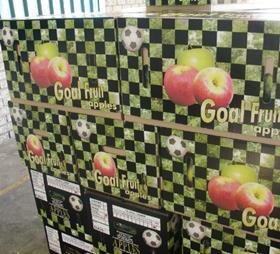
On 10 June, most South Africans wore yellow to work to mark the countdown to one of the world’s most prestigious sporting tournaments, the 2010 Football World Cup, now less than a year away. In the fresh produce sector, there are moves afoot to take advantage of the intense focus on South Africa during the next year to promote the country’s fruit exports.
Many South African exporters have already implemented promotional programmes to take advantage of the fact that South Africa is hosting the event. From the use of footballs on advertising material to incentive programmes for consumers to win visits to South Africa during the tournament, the World Cup is destined to be the focal point for the next 12 months.
The latest to consider getting in on the act are the apple and pear producers, although in this case there is a far longer-term objective in mind. Plans are underway to launch a major promotional campaign for apples in two key European markets next year, as the start of a long-term initiative to secure their future in these traditional South African markets.
The apple campaign will be conducted in the UK, which accounts for 40 per cent of South African apple sales, while the pear campaign will be split between the UK and Germany, each receiving around 20 per cent of the South African pear crop.
Stephan Conradie, product manager for both topfruit and stonefruit at the Pome and Stone Fruit Growers’ Associations, said that the past year’s plum campaign has been extremely successful and proved that, by promoting in core traditional markets, much value can be added to the category.
“We have now started a process to get industry approval to raise levies for an apple and pear campaign which will focus on the lessons we learned with plums this year,” said Mr Conradie.
This approval is a complicated and time-consuming matter, but DFPT CEO Anton Rabe said he was confident that there would be support for a far more comprehensive campaign than for plums.
Mr Conradie said that the assistance of the South African government’s department of trade and industry (DTI) will again be sought to supplement the funds that growers will contribute to the programme. “The Council of the South African Apple and Pear Producers’ Association will first approve our promotional plan before we can take it to the various apple and pear regions to obtain their support,” he said. “Once approved by the industry, we can apply to the minister for the introduction of a levy to fund the campaign and also negotiate with the DTI on their contribution.”
There is little doubt that the Council will support the campaign. Since the last South African apple campaign in the UK, which had to be abandoned after only one season due to the withdrawal of one key player, there seems to have been a change of heart. The fact that the new campaign will be generic and not category-specific will also encourage wider support. The success of the plum campaign has also done a lot to increase support for the campaign’s revival.
Mr Conradie said that South Africa has a reputation as a great produce supplier, but that it has not always been a great seller or promoter of its products. With the spotlight firmly on South Africa over the next year, it seems the ideal opportunity to launch an apple and pear campaign.
Since deregulation, there is now real hope for the first time that South African fruit and its origin will again be strongly promoted in Europe. The European and UK retail sectors will no doubt still remember the heady days of the strong brands Cape and Outspan, which raised awareness of new South African citrus and deciduous fruit to levels that will be difficult to achieve in the future.
The traditional European markets remain of vital importance, but some believe promotional efforts should be cast much wider, to the newer developing markets, in order to ensure long-term sustainability. The markets of the east offer opportunities for own-brand development and promotion that perhaps the retail-dominated markets of the west cannot rival.



